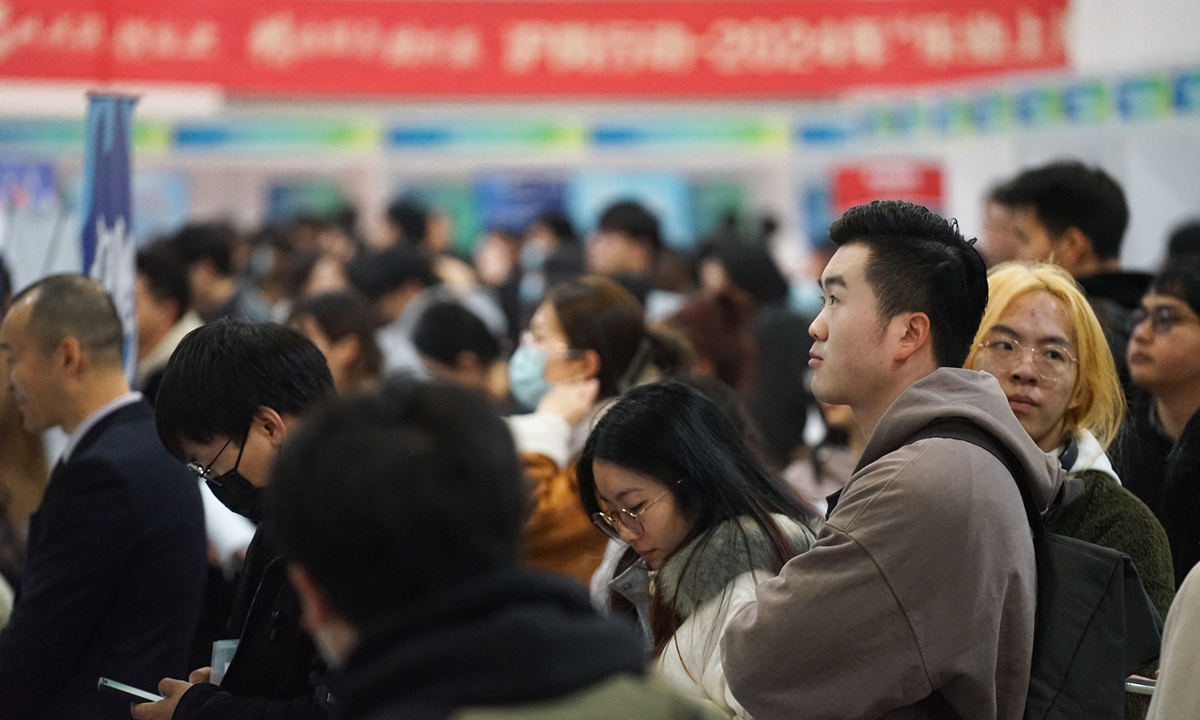China has favorable conditions for overcoming employment challenges in 2024: minister

Photo: Lu Ting/GT
China will provide more support to the private sector, small and medium-sized enterprises and other entities with large employment capacity, China's Minister of Human Resources and Social Security Wang Xiaoping said Saturday at a press conference on people's livelihood for the second session of the 14th National People's Congress (NPC) in Beijing.Wang said that the fundamentals of China's long-term sound economy remain unchanged and there are many favorable conditions for meeting challenges facing employment this year.
"We are confident in maintaining labor market stability," she said.
According to Wang, the job market has started off well this year, with enterprises resuming production, migrant workers returning to work smoothly and orderly, and an increase in job-seeking activities.
The demand for talent in artificial intelligence and big data is strong, and there is an increase in demand for services such as healthcare, accommodation, catering, and cultural tourism, the minister said.
Meanwhile, the recruitment demand for small and micro enterprises has significantly increased, and the demand for technical and skilled positions is rapidly rising, Wang noted.
Over the past year, China's employment situation has continued to improve and remained stable. China created a total of 12.44 million jobs in its urban areas in 2023. The surveyed urban unemployment rate on average in China stood at 5.2 percent in 2023, official data showed.
Job market data fully demonstrates the consolidation of the current positive trends related to China's economic recovery and the accelerated release of consumption potential. It also reflects the new trends and opportunities in the transformation and upgrading of traditional industries and the rapid development of new quality productive forces, she said.
However, the overall pressure on employment has not decreased, the minister noted. "Structural contradictions on employment still need to be resolved, and some workers face difficulties in employment. Stabilizing employment still requires more efforts," Wang said.
Wang noted that in 2024, the ministry will continue to implement policies aimed at reducing unemployment and work-related injury insurance rates. It will also optimize policies such as stabilizing job positions, providing special loans, employment and social security subsidies, and better releasing policy dividends.
Meanwhile, more efforts will be made to further expand employment channels, and the ministry will provide more support to small and medium-sized enterprises and other entities with large employment capacity.
Furthermore, she said the country will work to unleash employment potential by providing more support through guaranteed loans and tax reductions for start-ups. At the same time, flexible employment service guarantee measures will be improved, fully leveraging the role of over 6,900 gig-worker markets in matching supply and demand.
The government will carry out large-scale vocational skills training in key areas including advanced manufacturing, modern services and aged care.
In recent years, the government has provided subsidized vocational skills training to more than 18 million people each year, she noted.
Though there are over 200 million skilled workers in China, with over 60 million high-skilled talents, providing strong human resources support for high-quality economic development, there is still a shortage of digital, innovative, and composite high-skilled talents who can adapt to the development of new industries, new models, and new driving forces, Wang said.
Frontline workers, such as fitters, welders, and elderly care nurses, are generally in short supply. Talent cultivation needs to better adapt to market changes and industry demands, she added.
"Since the beginning of this year, we have organized a total of 32,000 job fairs, an increase of 20 percent year-on-year. A total of 26,000 special buses, trains and chartered planes were dispatched, transporting 880,000 workers from point to point," she said.
In 2024, China will see 11.79 million college graduates. The government will optimize employment services to job-seekers and guarantee the bottom lines to ensure the employments of special groups, according to the minister.

